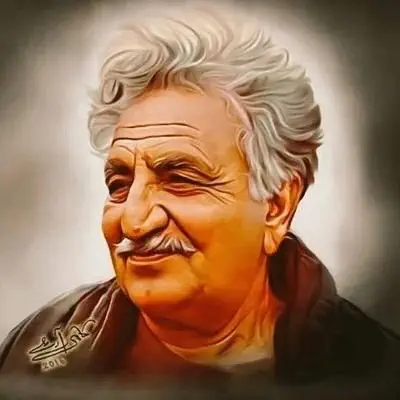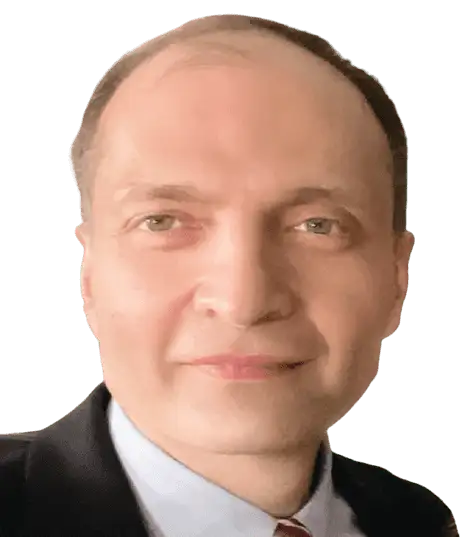The Strange Philosophy
I've read and listened to many poems by Ghani Khan, but "Ajaba Falsafa" stands out prominently. It ranks among my favorite poems, especially in its rendition by Sardar Ali Takkar. My admiration and respect for Ghani Khan are profound. Among the Pashto poets I admire, he is undoubtedly at the top of the list. It seems he understands life down to its core. From elegantly describing mundane things to tackling significant philosophical issues, he does so with mind-boggling precision. This impresses me greatly.
"Ajaba Falsafa," or "The Strange Philosophy," is a deeply introspective and philosophical poem by the celebrated Pashto poet Ghani Khan. This poem traverses the terrain of spiritual love, the quest for divine truth, and the inherent conflict between earthly desires and spiritual aspirations. It elegantly narrates the poet's journey of presenting his heart, metaphorically placed in a pot, to various embodiments of societal and intellectual authority, only to confront their incomprehension and dismissal of his spiritual devotion.
The narrative begins with the poet's attempt to offer his heart at a mosque, symbolizing his surrender to the divine. The heart, encapsulating his knowledge of sacred texts and his prostration, is rejected by the cleric for its lack of material offerings, highlighting the disconnect between ritualistic religion and the poet's notion of spiritual submission.
Undeterred, the poet then presents his heart to a magistrate, representing the rational, logical aspect of society. Here too, his offering is rebuffed; his heart's intangible qualities bear no weight on the scales of logic and law, underscoring the limitations of human judgment in comprehending divine love.
In his final attempt, the poet approaches a philosopher, seeking to validate his love through intellectual discourse. The philosopher, while recognizing the purity of the poet's quest, ultimately conveys that such a transcendent love cannot be rationalized or contained within the confines of worldly wisdom. It's a love that transcends the physical, visible only to the inward eye, ungraspable by knowledge alone.
Through these encounters, Khan articulates a poignant critique of societal norms and structures—religious, judicial, and intellectual—that fail to grasp the essence of divine love. He portrays a love that is vast and uncontainable, one that transcends the conventional frameworks of understanding and exists in a realm beyond rationality and materialism.
The poem culminates in the realization that the poet's journey is solitary and misunderstood by those anchored in worldly concerns. Yet, it is this very solitude and the refusal to conform that define the purity of his quest. The poet's strange philosophy is one of absolute devotion and love for the divine, a path that is fraught with rejection and misunderstanding by the world, yet resplendent with personal meaning and spiritual fulfillment.
"Ajaba Falsafa" stands as a testament to the enduring quest for divine connection in a world preoccupied with superficialities. It calls for an introspective journey towards understanding and loving the divine, advocating for a spiritual awakening that transcends the physical and the rational. Through this poetic narrative, Ghani Khan invites the reader to ponder the profound depths of spiritual love and the inherent contradictions of seeking divine truth in a material world.
The Strange Philosophy:
I placed my heart in a vessel, journeyed towards the mosque,
In the cleric's presence, declared it my sole offering.
---
It embodies my grasp of sacred chapters, Tahaa and Yaseen,
A testament to my devotion, my forehead’s touch to the ground.
---
The cleric, unimpressed, queried the contents of my pot,
Dismissed it for lacking worldly delights, sweets and desserts.
---
He criticized my appearance, deemed it unfit for sacred spaces,
Questioned the nature of my love for the Divine, advocating fear over affection.
---
Rebuffed, I sought judgment from a magistrate, bearing my heart as a gift,
Presented it as an offering to the arbiter of right and wrong.
---
The magistrate weighed it against his scales of logic, finding no place for such devotion,
Advised me to keep my peculiar love, my unworldly philosophy, to myself.
---
Disheartened, I approached a philosopher, amidst a crowd,
He pondered my questions, my earnest quest for truth.
---
With a smile, he spoke of a love transcendent, beyond the physical realm,
A love visible only to the inward eye, undimmed by worldly knowledge.
---
This path of love, unique and solitary, he acknowledged with respect,
Invited me to embrace my inner Majnun, to revel in my mystical quest.
---
As the world deems me mad for shunning its allure,
I find richness in loss, a love that transcends the worldly plane.
---
With every step, a dance; with every look, a deeper seeing,
My heart, a vessel of divine love, yearns for no less than eternity.
---
Thus, with heart in hand, I wander into the night,
Seeking solace in the divine tale, the exquisite philosophy of love.
---
This journey of love, madness, and divine communion,
Unfolds as a testament to a love that defies logic, embracing the ineffable.
Ajaba Falsafa:
zrr’h me waachaw’h pa taal ke
da jumaat kuse la laarram
da mulaa pa khpo me kekhod
maa v daa me sadaqa da
daa che sumra z’h pohegam
pa ‘taahaa’ ao pa ‘yaseen’
daa che sumra khkata tlay shi
pa sajda zama jabeen
mulaa makh zama na waarrao
we daa sa di sta taali ke?
N’h pulao day na ferni da
na halwa na faaluda da
we ye shara zahir gore
ao zahira t’h faaseq ye
daa da rab sara da meene
taa raaghashte sa qeesa da
wyara wyara da qahaar na
da eeman asli hissa da
da junun ao da janan sta
sa muhmala falsafa da
zrr’h de kegda pa seena kei
sharbat raaorra gelaas raaorra
maa khpal taal ddak da khobunu
da qazi darbar la yawrr’h
wrrukay laal me raa ochat k’h
taar khaane ao maar la yaorr’h
maa v ay da kho ao bado
ay da toro speeno khaana
daa ddaalai zama qaboola
pa naama krra da janaana
qazi kenaast’h pa takht khpal
pa speen sar ye dastaar kekhod
pa yao laas ye toba kekhwa
pa bal laas ye hesaar kekhod
tala ye porta da mantaq krra
yao khwa day yao khwa me taal wo
yao khwa shor wo kamzorai we
bal khwa jamay wo kamal wo
yao khwa aqal wo daleel wo
wrak be khoda ghunde khyal wo
Ma v da lewabtoob wakhla
aw khpl aqal p tala kra
Ma v da zama khumar’
Da khpl elam katmala kra
maa ve ay da insaf raba
daa da wrako manzal gora
maa ve ay da tol ameera
daa be tola talal gora
qazi starge krrale patte
shundde bande, makh preshaana
we afsos zama na wrak day
daa che t’h ghwaarre zamaa na
za kho zor yam da insane
za surror da adam naym
z’h tor weenam ao speen weenam
bas zama dagha qeesa da
dagha tol zama umeed day
daa talal me falsafa da
falsafi da mulk walaarr wo
wu chaapera ye aalam
da khod speen mashal pa laas
juda kol ye ziyaat ao kam
fekar tez, nazar baareek
daleeluna ye klak mekhuna
da mantaq pa paattko paattko
wo rawan pa bara sam
maa v ay da hosh ao aqal
da ranrraa bala mashaala
yao be khoda lewanay day
har yao saaz ye day maatam
sta da pohe da daryab na
yao qatra da ranrraa ghwarri
sa sawab da khanda ghwarri
sa matlab da khanda ghwarri da gham
falsafi krre starge porta
khula muskai starge rokhaana
kharre kharre da gham larre
pake raghle naagahaana
we ay zama ghamgeena zoya
khesht wajud lari na soray
da d’h noor ba hala gore
che pa patto stargo gore
elam speem rokhan mashaal day
kho pre na shi leeday stori
da noor starge de pa zrr’h k’h
da noorunu dunyaa gore
samandar da khesht rok ger krri
da mantaq pa kuzanrrai ke
da gham baad day chaa newalay
tol da tale ao darrai ke
de da khod pa mekhana ke
sta da skhalo sharab nishta
che da meene saaz pre waawre
dalta agha rabab nishta
sta nazar juda nazar day
sta jahan juda jahan
taa ke majnun da sta naseeb ke bayaban
sta masti wahi ttaaluna
pa khanda da buddai ttaal ke
da hilal pa nari khat ke
waai shundde da janan
lewania lewania
daa ttol aqal zama wakhla
kho badal ke raala raakrra
yao qatra da khpal arman
sta da ukhko na qurban sham
sta dardunu ta paskhegam
che pa dwaaßo ke khumaar day
da khobunu da janan
taa che makh da dunyaa waarrao
dunyaa chaghe krre paagal day
taa taawaan ke gatta okra
mung pa gatta ke tawaan
che jwandun da khaisht taalaa shi
gham tash gham shi da dilbar
sumra mast ye har qadam shi
har nazar sumra rokhan
raawrra raawrra zrr’h de raawrra
che ye z’h pa zarrgi khkul krram
har arman ye khumaari day
masta ye hara waswasa da
raaka raaka che jwanday sham
wai da marga wyara marg day
jwand arman day ao janan
k’h umeed k’h talwasa da
waaya waaya sumra masta
da delbar da shaan qeesa da
da junun ao da janan da
sa ajaba falsafa da
maa khpal zrr’h laas ke raaghundd k’h
tore shpe ao gham la yaorr’h
da maakhaam tyaar’h ke wrak k’h
da saba shabnam la yaorr’h
us yao za yam yao arman day
da janan da shan qeesa da
wrrukay gul ao lwe khazan day
da umeed yao talwasa da
maa margi ta shoro karre
da jwandun da khaisht qeesa da
da junun ao da janan daa
s’h ajaba falsafa da

